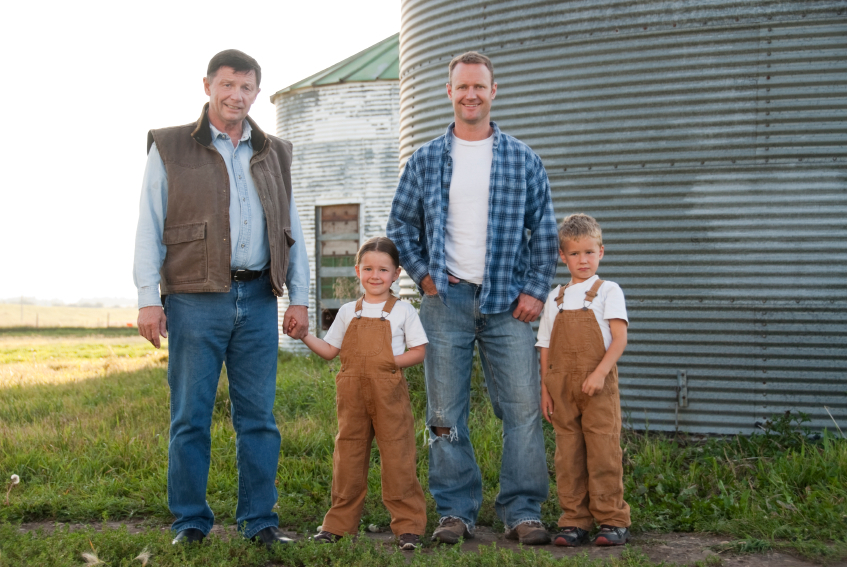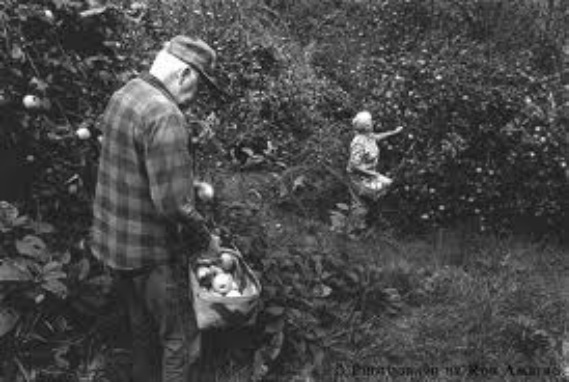The Pursuit of a High Quality of Life
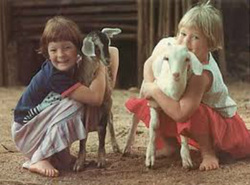
Today’s successful small farmers are pioneers on the cusp of a revolution that will redefine farming and the farming lifestyle. They are intelligent, educated, and goal-oriented when it comes to running a business. What sets them apart from their counterparts in other business sectors is their deep-rooted appreciation for the lifestyle they have chosen and their personal recognition of the value of that lifestyle that transcends considerations of material wealth. Though these farmers are often humble to the point of crediting outside forces for their success, it has ultimately been their own efforts and their understanding of the “quality of life” that has led them to their success.The life and the work of a small farmer are one. The small farmer does not punch a clock and leave the job at five. When one chooses to farm and truly wishes that endeavor to be a success, all aspects of life become integrated with all aspects of work. Viewed from that perspective and the fact that few ever expect or achieve great material wealth as a small farmer, the concept of “quality of life” takes on enormous significance.

Defining "High Quality of Life" or "Overall Happiness"
The concept “quality of life” is subjective in the extreme, and to quantify it or apply it to a study leaves the study open to unique scrutiny. There are many ideas and ideals that are components of the perception of just what constitutes a "high quality of life". Using two very diverse but accepted scales (Economist Intelligence Unit and Bhutan’s “Gross National Happiness Index") a common ground definition that encompasses the basic tenets of the concept (as perceived by the majority those interviewed, regardless of social,economic, or cultural barriers) emerge: 1) Happiness: a general sense of well being and a consistent positive outlook, a positive or negative sense of self within the context of a person's life work, environment, and community. 2) Health: within the context of age and gender, the overall physical and mental condition of an individual and his/her access to health care. 3) Prosperity: both the reality and the perception of material wealth within a person's own context. When establishing their own model for the small farm in the New Millenium, farmers, new or experienced, must understand the concept of "the quality of life", personalize it, and utimately put a value on it. (1)(2)(3)(4)(5)(6) |
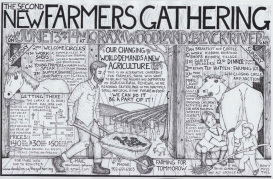 Sharing Knowledge Within the Farm Community: A New Standard
With Deep Roots in Traditional Agriculture.
Externals and Intangibles
Sustainanable-agriculture expert and author of many books on the subject, John Ikerd has noted that there are external and/or unquantifiable elements that also compose an individual's perception of "living a high quality life." Some examples : Passion : '. . . a genuine enjoyment of what one does and pride in the product produced. . . freedom and the intellectual challange of being able to think for one's self and make one's own decisions.' The Holistic Community: '. . . these new sustainable farmers build relationships, among each other, with their customers, and with their land. . . . relationships are interdependent relationships of choice, rather than relationships of dependency or necessity. . . sharing ideas and information . . . not trying to drive each other out of business; . . .trying to help each other succeed. . . not trying to take advantage of their customers to make quick profits but trying to create lifelong social and economic relationships. . . buying locally and marketing . . refusing to exploit each other or to exploit the land.' Understanding What Money Can't Buy: "University psychologists Ed Diener and Martin Seligman reviewed more than 150 scholarly studies relating wealth to happiness Their 2004 report confirmed a growing consensus that beyond some very modest level of income – around $10,000 per person, they suggest – increases in income do not necessarily bring greater happiness. A 2003 British cabinet office report also confirmed, “Despite huge increases in affluence compared with 1950, people throughout the developed world reported no greater feelings of happiness.” 'Farming with purpose is about the pursuit of happiness . . . if, in the pursuit of greater profits, farmers end up diminishing their quality of life, they will have gained nothing because they have taken the happiness out of farming.' (7)(8) |
In Their Own Words: Successfull Small Farmers Describe What Happiness and the High Quality of Life Means to Them:
Excerpts From Interviews Conducted Over the Course of Five Months Wth Seven Upstate NewYork Small Farms in the Winter of 2010 . Please Note: Although these Interviews Were Conducted Utilizing Strict CITI Human Research Subject Standards Conducted By a Certified Interviewer, the Names of the Interviewees Have Been Altered for this Particular Application and the Pictures Are Not the Specific Subjects Discussed in the Text but Only Representative Dipictions Related to the Subject or the Specific Niche Applicable to the Intreviewees (9)
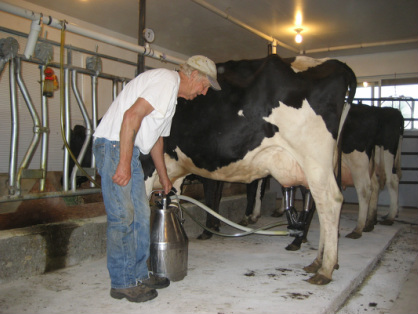 Small Managable Herds, Producing Milk that Fetches a Premium Price Make Organic Dairying A Viable Business Model for the Small to Medium Size Farmer
Steve and Faith Hope: Organic Dairy Farmers. Did you ever think you would be doing anything else with you life?, Steve: That’s the “problem,” no . . . I mean there really isn’t anything else that interests me (much laughter)! Faith: I have to admit it’s been hard for me (at times). I think today I can say really, I am happy and I really respect what he does; and you know seeing how other people live and all the ‘bs’ (sic) that’s out there, I feel very fortunate to be here with him. (11) Diversity: The All Around Farm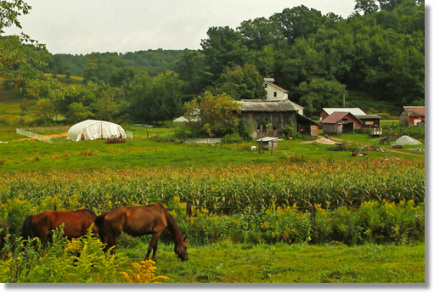 Reversing the Specialization Trend, the Diverse Farmer Utilizes Multiple Markets and Plant and Animal Symbiosis to His Advantage
Thomas R. Randall : General Farmer and Fresh Juice Plant Owner
Where do you go from here, are you going to phase yourself out of the daily farming operations? " If I feel as good as I do now (then) I’ll probably just keep going, because there’s nothing else I want to do actually, or maybe I’ll do a little more fishing or something like that . . . you know, especially in the spring, I (still) get really excited I guess because I’m gonna plant, I’m gonna see things grow . . . I’ve enjoyed it; as far as profit-wise, no,but as far as self-esteem . . . and there’s one thing I look at, ‘everything’s gonna be better next year', and I think that’s all farmers. . . I think that’s what keeps me going. Until I lose that, probably I’ll be alright." (13) The CSA: Sharing A Piece of the Farm Directly with Consumers.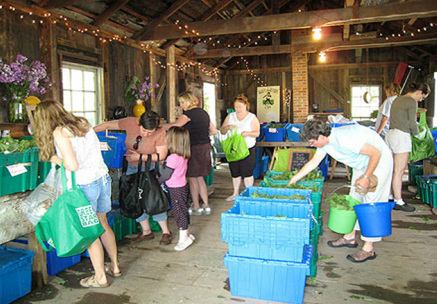
Stepheny and Cary Graft: Diverse CSA Farmers
Are we happy with the choice we made (to become farmers) ?
Stephany: Yeah, yeah . . . there was a lot of other choices. Everybody says, ‘Oh, you got so much land, it’s so beautiful and the farm is so great, oh, you’re so lucky!’ and it’s like ‘if you only knew what we’ve gone through to get this ! Cary: If at nighttime we can go for a walk, we can walk down through our orchard, we got a four-acre pond down there, we can go fishing in it. It’s kind of relaxing doing all that stuff . . .but people think farmers work a forty hour week, not even close. I think I’m the happiest when I’m in my tractor . . . I wouldn’t give this life up; so I could have been retired [from another job he started right out of high school] , yeah, now [I could have] sit(sic) down, go fishing, go hunting, do what ever I want at age 55, but I wouldn’t have what I got here . . .I probably wouldn’t have met Stephany . . . (14) |
Grape and Small Fruit Farmers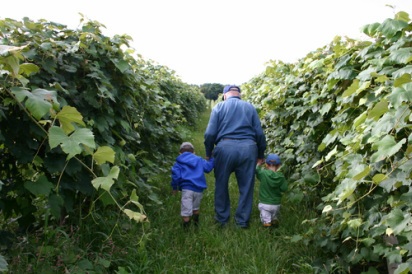 Diverse Markets and Uses Create Many Opportunities for the Small Fruit Grower
Gale and Den Straw: Grape and Small Fruit Farmers for Forty Years
"We’re comfortable; sometimes too successful . . . I always described my goal in life to be thoroughly middle class, I think that we are, we achieved our goal. We’re comfortable and if it wasn’t for health issues, there would be no issues at all. You know I’m not saying we’re rich, we don’t travel, we’re land rich and money poor . . . We’re able to pay our bills and we have good things. Other people are worse off than we are, and we are well aware of that . . . I don’t think we could be any more middle-class (but) if we paid ourselves by the hour, we’re just stupid! No sane person would work (like we do) for that amount of money." (10) The Mennonite Model: Traditional Values That Work Today.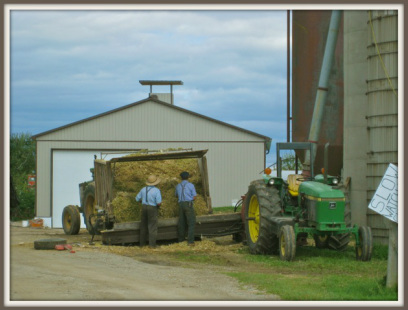 Combining the Technologies of the Present and the Past With a Deep Sense of Morality Creates a Compelling Model for the Small Farmer.
Ephriam Merzan: Dairy and Cash-Crop Farmer and Mennonite Deacon
Do you consider yourself spiritually and materially successful ? "Well, as far material is concerned, we are well-to-do in that we’re well supplied. We are not going hungry, we have plenty; I guess I would answer that in the affirmative. Spiritually, I always sense the need to grow but on the other hand, I count my blessings too. The Lord has truly blessed us." (12) Unique Niche Farming: Imagination, Ingenuity and Success on the Small Farm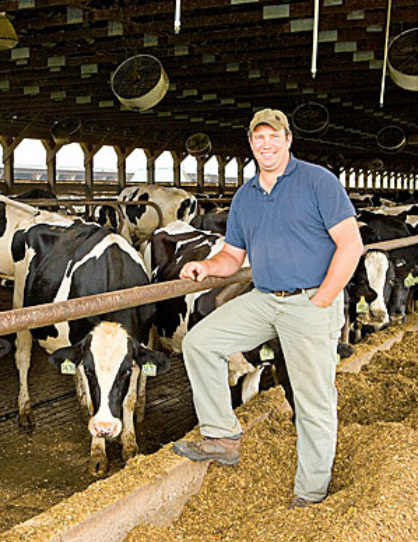 Niche and farmer-to -Farmer Services Like Bringing Problem Cows and Cattle Back to Healthy Production Opens New Markets for the Small Farmer.
Lenny Kaples: Livestock Rehabilitator and
Broker Do you consider yourself successful and satisfied ? " I admire and respect the Mennonite and Amish around here. I consider that they are very successful ‘cause they’re living a happy life, they’re enjoying what they’re doing . . . paying their bills, taking care of their family. They’re good stewards of the land, they’re good neighbors, good citizens. Are they making a lot of money? Un-uh (no), but they don’t need a lot of cash . . . so, I would say that’s successful. . . So when I look around, I am happy with what I’m doing [like the Mennonites]." (15) |
Apples and Large Fruit : The Revival of Fresh Fruit in the New Millenium(16)
Maxson Thiem : Retired Orchardist and Big Fruit Farmer
Sixty-Six Years On the Farm: Retired at Eighty-Two.
I loved it. I(t) was 66 years that I was farming and I hated to give it up but I always have heard so many people say I can’t wait till I retire. I never felt that way. I got up at five and if I had to go out with a load at two, I was up. I looked forward to it, it (sometimes)was a hassle, but I looked forward to it . . .I liked to work hard and I liked to see things keep moving. (17)
Sixty-Six Years On the Farm: Retired at Eighty-Two.
I loved it. I(t) was 66 years that I was farming and I hated to give it up but I always have heard so many people say I can’t wait till I retire. I never felt that way. I got up at five and if I had to go out with a load at two, I was up. I looked forward to it, it (sometimes)was a hassle, but I looked forward to it . . .I liked to work hard and I liked to see things keep moving. (17)
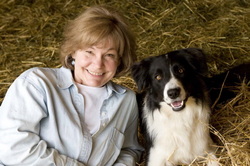
Is the Tail (the farm) Wagging the Dog (farmer) or Is the Dog Wagging the Tail . . .or a little of both?
Romanticism and the idyllic view of farming has and will continue to be part of its mystique and lure; and while there is certainly substance to this perspective, success and fulfillment do not come without sacrifice and extremely hard work. Models of the past have often given "lip-service" to the myth of the high quality of farm life while ignoring the reality of the daily pressures and stress that are omnipresent in an enterprise that is dependent on the right alignment of such elements as the weather, fickle markets, and a wide range of favorable economic conditions.
Farming in this New Millennium will not be for the "faint of heart." With the knowledge of modern, sophisticated perceptions of “quality of life” as it relates to the
non-agrarian world, the farmers in this New Millenium will utimately need to assign a high value to benefits of "the farm life" that supercede the material gains that so often are inconsistant or cyclical in farming. To requote Gale and Den Straw, successful farmers for more than 25 years:
"I don’t think we could be any more middle-class (but) if we paid ourselves by
the hour, we’re just stupid! No sane person would work (like we do) for that
amount of money." (18)
Romanticism and the idyllic view of farming has and will continue to be part of its mystique and lure; and while there is certainly substance to this perspective, success and fulfillment do not come without sacrifice and extremely hard work. Models of the past have often given "lip-service" to the myth of the high quality of farm life while ignoring the reality of the daily pressures and stress that are omnipresent in an enterprise that is dependent on the right alignment of such elements as the weather, fickle markets, and a wide range of favorable economic conditions.
Farming in this New Millennium will not be for the "faint of heart." With the knowledge of modern, sophisticated perceptions of “quality of life” as it relates to the
non-agrarian world, the farmers in this New Millenium will utimately need to assign a high value to benefits of "the farm life" that supercede the material gains that so often are inconsistant or cyclical in farming. To requote Gale and Den Straw, successful farmers for more than 25 years:
"I don’t think we could be any more middle-class (but) if we paid ourselves by
the hour, we’re just stupid! No sane person would work (like we do) for that
amount of money." (18)
